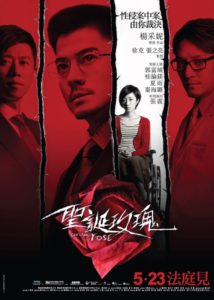Christmas Rose
圣诞玫瑰
Hong Kong/China, 2013, colour, 2.35:1, 89 mins.
Director: Yang Caini 杨采妮 [Charlie Young].
Rating: 6/10.
Okay courtroom drama is watchable but doesn’t realise its full potential.
Hong Kong, 31 Oct 2012. Gynaecologist Zhou Wenxuan (Zhang Zhen) is visited at his clinic by piano teacher Li Jing (Gui Lunmei) for a check-up after she complains of lower-body pains. Li Jing, who was abandoned when young by her mother (Xia Wenxi) and later was crippled in a traffic accident, teaches piano to Tingting, the young daughter of Zhou Wenxuan and his wife Mingjun (Qin Hailu). In his examination room, Zhou Wenxuan sees Li Jing alone; but suddenly the staff are alerted by her cries and find her on the floor, trying to crawl out of the room. She charges Zhou Wenxuan with indecent assault, and the case attracts media attention because of Zhou Wenxuan’s celebrity. The  prosecution is led by Chen Zhitian (Guo Fucheng), a highly principled, former defence lawyer – and son of a well-known prosecutor (Zhang Tongzu) – who is on a mission to see justice done. The defence is led by Xue Zhaowen (Xia Yu), the cocky son of a rich Mainland entrepreneur who’s never lost a case yet. At the initial hearing, Zhou Wenxuan pleads not guilty, and during the first hearing Xue Zhaowen pretty much destroys Li Jing’s charges, despite the fact that there were no witnesses to the alleged event. But when new evidence comes to light during the second hearing, the case starts to get complicated.
prosecution is led by Chen Zhitian (Guo Fucheng), a highly principled, former defence lawyer – and son of a well-known prosecutor (Zhang Tongzu) – who is on a mission to see justice done. The defence is led by Xue Zhaowen (Xia Yu), the cocky son of a rich Mainland entrepreneur who’s never lost a case yet. At the initial hearing, Zhou Wenxuan pleads not guilty, and during the first hearing Xue Zhaowen pretty much destroys Li Jing’s charges, despite the fact that there were no witnesses to the alleged event. But when new evidence comes to light during the second hearing, the case starts to get complicated.
REVIEW
An okay courtroom potboiler whose high points promise a better movie overall than in fact turns out, Christmas Rose 圣诞玫瑰 still holds attention for most of its length thanks to a generally strong lineup of acting talent and a seemingly simple story that develops unexpected (if often unbelievable) twists and turns. In its final stages, however, the script, lead written by Lv Guannan 吕冠南 (A Beautiful Life 不再让你孤单, 2011; The Last Tycoon 大上海, 2012), gets a bad attack of soppy inclusivity instead of heading for a bloody showdown – a disappointment after all the twisty shenanigans of the previous hour and again showing the film’s inability (or unwillingness) to really develop its dramatic potential. Funded by Mainland money but set and shot in Hong Kong, Rose is worth a look thanks to its Greater China cast and smooth mounting; but as courtroom dramas go, it’s nuked by the recent Silent Witness 全民目击 (2013) from the Mainland.
Built, like many of the best whodunits, out of a few basic blocks, the film takes a while to settle down after a flashily edited introduction that’s simply distracting. When it does find its equilibrium, the essence is simple: was nice but crippled piano teacher Li Jing sexually molested (under the guise of a checkup) by celebrity gynaecologist Zhou Wenxuan in his clinic? In what is basically a locked-room mystery, there were no witnesses; so the trial becomes a series of character-assassination attempts by the messianic prosecutor on one side and the cocky, unbeaten defence lawyer on the other. Largely via the character of the prosecutor, the script flirts with issues like upholding justice, protecting the innocent and what exactly is the function of the law; but they’re never developed much beyond catchphrases, in the same way that the scenes of cross-examination never develop much of an individual head of steam (unlike, say, the barn-storming sequences in Silent Witness).
The running-time of only 89 minutes hints that maybe – and for whatever reasons – a lot was left on the cutting-room floor, and certainly the abbreviated nature of some sequences supports that theory. Whatever the case, there’s a sense throughout of the drama and the performances never being allowed to breathe to their fullest, a restlessness typical of one of the producers, Xu Ke 徐克 [Tsui Hark]. Most to suffer on the performance side are Mainland actors Xia Yu 夏雨, who’s surprisingly effective as the slick, yuppie-ish defence lawyer, and Qin Hailu 秦海璐 as the accused’s wounded but supportive wife. As they finally appear on screen, both roles seem underwritten. As the crippled plaintiff who may or may not be making the whole thing up, Taiwan actress Gui Lunmei 桂纶镁 doesn’t get much dialogue to work with but still creates a believably bipolar character to keep the mystery stoked.
Other roles, from Taiwan’s Zhang Zhen 张震 as the accused to Hong Kong’s Liao Qizhi 廖启智 [Liu Kai-chi] as a doubting lawyer are well played within the limitations of the script. Unfortunately, the same can’t be said for top-billed Guo Fucheng 郭富城 [Aaron Kwok] as the obsessed, high-principled prosecutor: in what is virtually a dry run for his similarly one-note-intense performance in Silent Witness, Hong Kong’s Guo is the weak link in an otherwise strong cast. Witness was strong enough overall to withstand his uninflected playing; in Rose, however, it’s more damaging, especially as his character is meant to carry the film’s conscience. The script is equally at fault here – it’s never explained why he decides to take on this particular case after turning down so many – but Guo’s lack of screen chemistry with both Xia and Gui doesn’t help the film.
As a directing debut by Taiwan-born, Hong Kong-based actress Yang Caini 杨采妮 [Charlie Young], 39, Rose qualifies as a flawed but interesting undertaking, especially for a performer largely known for romances and sweet roles, at least in the first half of her career. Kudos is due to her, then, for the unexpected choice of material, an unforgiving genre that has its own established rules. Equal kudos, however, is due the experienced Hong Kong team she’s surrounded herself with – from editor Zhong Weizhao 钟炜钊 [Azrael Chung] to veteran cinematographers Zhong Youtian 钟有添, Zhang Dongliang 张东亮 [Tony Cheung] and Chen Zhiying 陈志英, and to producers Xu, with whom she’s worked from her earliest days in the mid-1990s (The Lovers 梁祝, 1994), and Zhang Zhiliang 张之亮 [Jacob Cheung], who gave Yang one of her best roles (Intimates 自梳, 1997). They, along with several others like “artistic and creative director” Xia Yongkang 夏永康 [Wing Shya] – presumably responsible for much of the movie’s sleek visual design – are generously thanked in the closing credits.
CREDITS
Presented by Bona Film Group (CN), Bona Entertainment (HK). Produced by Creative Alliance (HK).
Script: Lv Guannan, Yao Tianlang, Liang Wei’an. Original story: Yang Caini [Charlie Young]. Photography: Zhong Youtian, Zhang Dongliang [Tony Cheung], Chen Zhiying. Editing: Zhong Weizhao [Azrael Chung]. Music: Li Ye, Jin Peida [Peter Kam]. Art direction: Wang Huiyin. Costume design: Lin Peiyi. Sound: Liang Lizhi, Zeng Jingxiang [Kinson Tsang], Yao Junxuan. Visual effects: Zheng Yaoming (3 Plus Animation Production). Artistic/creative direction: Xia Yongkang [Wing Shya]. Executive director: Liu Jingyi.
Cast: Guo Fucheng [Aaron Kwok] (Chen Zhitian/Tim), Gui Lunmei (Li Jing/Jane), Xia Yu (Xue Zhaowen/Freddy), Qin Hailu (Mingjun, Zhou Wenxuan’s wife), Zhang Zhen (Zhou Wenxuan/Winston, doctor), Liao Qizhi [Liu Kai-chi] (Nan), Wan Qian (Megan Li, Chen Zhitian’s fiancee), Xia Wenxi [Pat Ha] (Liu Qian, Li Jing’s mother), Li Qihong (Eve Luo, piano firm’s boss), Gan Guoliang [Kam Kwok-leung] (Hill, Chen Zhitian’s former boss), Kun Ling (secretary), Huang Suhuan (Lin, Li Jing’s nurse), Zhang Tongzu [Joe Cheung] (Chen Zhitian’s father), Chen Jingfeng (young Chen Zhitian), Zhou Nianqin (defence lawyer), Yang Qi (Chen Fenghua), Gao Erheng (housemaid), Jin Xingxian (magistrate), Liu Qiling (Mandy Wu, gynaecologist), Chen Liling (nurse), Pan Litong (magistrate).
Release: Hong Kong, 23 May 2013; China, 24 May 2013.
(Review originally published on Film Business Asia, 16 Nov 2013.)
